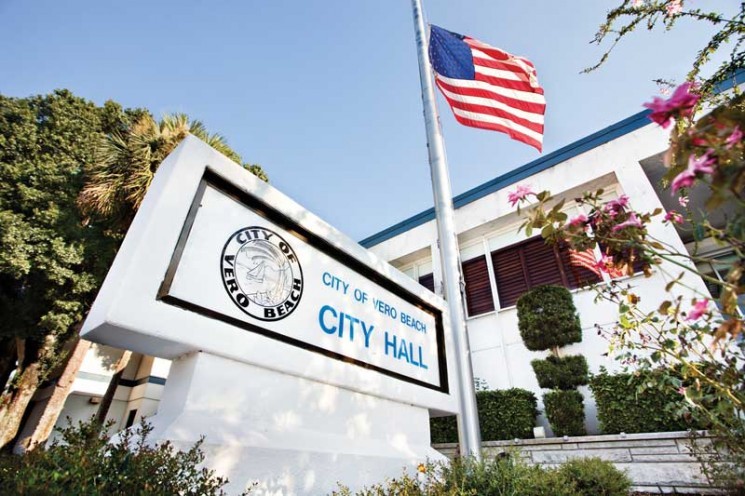VERO BEACH — In its last meeting before leaders get their 2012-13 budget books to review more than $20 million in expenditures, the Vero Beach City Council finished its agenda of mostly ceremonial and housekeeping matters in just 79 minutes.
The council gave the Abilities Resource Center-Sun Up organization a proclamation to congratulate the two component groups for successfully merging to better service area clients with varying abilities.
The city also recognized the Vero Beach Lifeguard Association for its exemplary service in keeping beachgoers — residents and tourists alike — safe from ocean hazards. The city has provided the funding to keep all three of its major public beaches guarded, where several beaches countywide outside the city have lost lifeguard coverage due to budget cuts.
Council members recognized a local business, Rains Insurance, for providing a sponsorship to help keep the Royal Palm Pointe fountain up and running despite budget pressures to shut it down.
The council approved two planning and zoning issues and a budget amendment to reflect changes to revenues and expenditures at the six-month mark in the fiscal year
Mayor Pilar Turner thanked City Manager Jim O’Connor and Finance Director Cindy Lawson for keeping a close eye on the budget and for communicating financial information with the council much better than staff had in the past.
“Last year we did not find out that we had overrun our budget by $3 million until October,” Turner said.
Lawson said the city got some official figures on property taxes and that property values have only dipped by 2.6 percent. O’Connor said the upcoming budget has been designed around the rollback property tax rate, which is the rate which will glean the same $4.1 million in property taxes.
“The rollback rate will be very minimal,” O’Connor said, meaning that the difference between the current millage and the proposed millage rate will not be great because the decrease in property values is only 2.6 percent.
The council and staff discussed a possible change in the policy regarding the cost of burial space at the city cemetery. Currently, property owners receive a discount as city taxpayers, but people who rent residential property inside the city do not get that discount. The matter was brought up by Councilwoman Tracy Carroll.
“Because a portion of your rent would go to the owner to pay the property taxes to the city,” Carroll said.
It was suggested that the ordinance be changed to primary place of residence in the city. The staff was directed to work on the matter and bring it back, but one exception was made for a local resident who is in the process of buying space at the cemetery as the matter was timely.
O’Connor gave the council an update on the sale of the electric utility to Florida Power and Light, saying that the city has been working with Orlando Utilities Commission to help extricate the city from its power contracts.
“We think we’re making very good progress,” O’Connor said, reminding the council that Sept. 30 is the deadline for the transactional attorneys to find “a clear path forward.”
Councilman Dick Winger initiated a discussion about police pensions and asked that the staff take a hard look at what the financial situation of the city will look like when Vero does not have the $5.6 million in transfers from the electric utility. Winger estimated that there would be a net $4 million post-sale annual deficit.
“I’m trying to set a course of action here for the budget process rather than to come to any conclusions tonight,” Winger said.
Winger asked O’Connor to develop some proposed revisions to bring down the future costs of the police pension plan.
“It should affect anything already earned, but it should change the curve of escalation to something the city can afford,” Winger said.
Despite the fact that the city only collects $4.1 million in property taxes each year, the budget for the police department is $7 million per year. A full $6 million is personnel costs — salaries, health insurance, pension contributions and other benefits.
O’Connor suggested the actuarial firm that handles the police pension fund make a presentation of the council.
Mayor Pilar Turner agreed that the city should look at potential savings that can be achieved in both the police pension plan and the general employee pension plan.
“They’re not sustainable in the current forms and we need to look at revisions,” she said, adding that the police pension fund is healthy and has been well-managed. However, the fund was hit hard by market factors which negatively affected stocks in which the fund was invested.
With regard to the budget as a whole, O’Connor said the staff and council need to take a look at the structure of the city overall and how the city can function more efficiently and effectively, to eliminate positions which may be open.
In the police department, keeping “boots on the ground” is a very high priority, O’Connor said.
“We’re trying not to eliminate positions, but you still have to reduce costs,” he said.
Councilman Jay Kramer urged O’Connor to give city employees a “roadmap” so they can plan for reduced income or even for potential job loss. O’Connor said he has made it clear to department heads what will be expected and how the cuts may affect personnel. Employees have been put on notice and they understand what’s coming, O’Connor said.
“That’s why we’re trying to throw this stuff out early and not have anybody caught by surprise,” O’Connor said.

